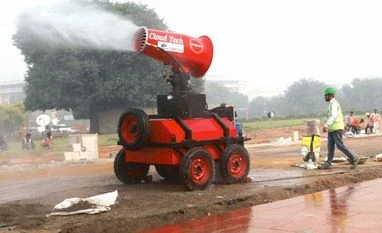There is no conclusive data available to establish a direct correlation of death or disease exclusively due to air pollution, Minister of State for Health Bharati Pravin Pawar told the Lok Sabha on Friday.
The minister, however, said air pollution is one of the many factors affecting respiratory ailments and associated diseases.
Health is impacted by a number of factors which includes food habits, occupational habits, socio-economic status, medical history, immunity, heredity, etc., of the individuals apart from the environment, Pawar said in a written reply.
"There is no conclusive data available to establish a direct correlation of death/disease exclusively due to air pollution.
"While air pollution is known to be one of the aggravating factors for many respiratory ailments, specific information on the number of deaths exclusively due to air pollution is not available," Pawar said.
Pawar listed several steps taken by the government to address air pollution issues such as Pradhan Mantri Ujjwala Yojana (PMUY) which aims to safeguard the health of women and children by providing them with a clean cooking fuel LPG, Swachh Bharat Mission to clean up streets, roads and infrastructure of India's cities, smaller towns, and rural areas. Swachh Hawa is an integral component of Swachh Bharat, the minister said.
She referred to the Central Sector Scheme on 'Promotion of Agricultural Mechanization for in-situ management of Crop Residue in the Punjab, Haryana, Uttar Pradesh and NCT of Delhi', agricultural machines and equipment for in-situ crop residue management are promoted with 50 per cent subsidy to the individual farmers and 80 per cent subsidy for establishment of Custom Hiring Centres.
More From This Section
Besides, Sustainable Alternative towards Affordable Transportation (SATAT) has been launched as an initiative to set up Compressed Bio-Gas (CBG) production plants and make CBG available in the market for use in automotive fuels.
A city-specific clean air action plan has been prepared and rolled out for implementation in 131 non-attainment and million plus cities by Ministry of Environment, Forest and Climate Change (MoEF&CC), with a focus on city specific short/ medium/ long term actions to control air pollution from sources such as vehicular emission, road dust, burning of biomass/ crop/ garbage/ Municipal Solid Waste, landfills, construction activities, industrial emission, etc.
The Ministry of Health has launched National Programme on Climate Change and Human Health (NPCCHH) at National Centre for Disease Control (NCDC), with the objective to create awareness, capacity building, health sector preparedness and response and partnerships related activities on the climate sensitive health issues in the country since 2019.
Now the programme has expanded in all the states and Union Territories and activities are conducted in the form of training on Climate Sensitive Diseases, Surveillance on Acute Respiratory Illnesses and Heat related Illnesses, generation and dissemination of IEC on Air Pollution and Heat and its health impacts on health, Pawar said.
)